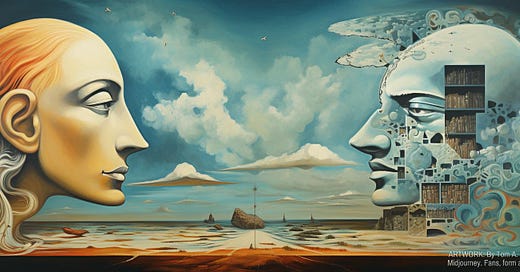Awakening Beyond Illness: The Enigma of Mental Health in Spiritual Transformation
The Mirage of Mental Illness in the Light of Awakening
Awakening – a term bandied about with the casualness of a coin tossed into a wishing well.
Yet, in the realm of spiritual transformation, it's the holy grail, the endgame, the unraveling of the Gordian knot of existence. Consider mental illness in this context.
Traditionally viewed as a pathology, a deviation from a perceived norm, it stands as a testament to the mind's labyrinthine complexities. But what happens when awakening enters the fray? The so-called illness, often tethered to the 'I', finds itself in a quagmire. As the 'I' dissolves, does the illness lose its identity, its very foundation? Picture a shadow clinging to a form. As the form dissipates, what becomes of the shadow?
Mental illness, a shadow of the mind, confronts this existential paradox in the face of awakening. The story of Buddha, transcending suffering under the Bodhi tree, paints a vivid picture. Here, mental anguish faced its ultimate foe – enlightenment.
In this battle, does the illness morph, or does it fade into the ether of irrelevance?
Illusion of Suffering: A Dance of Consciousness
Dive deeper into this enigma, and you stumble upon a profound revelation: the illusion of suffering.
Mental illness, in its essence, is rooted in suffering – a suffering born of the mind, of the 'I'. But in the awakened state, where the 'I' is but a wisp of smoke in the grand expanse of consciousness, suffering loses its grip. It becomes a specter, a phantom haunting an abandoned house. Consider the legend of King Janaka, a ruler who attained self-realization.
In his awakened state, the troubles of his kingdom, akin to mental turmoils, appeared as ripples on the surface of a vast ocean – present, yet inconsequential. Here, we witness the transformation of suffering, not its eradication…
…but its transcendence into a state of sublime indifference.
Phantom of the 'I': The Disintegration of Illness
Finally, we arrive at the crux of the matter – the disintegration of the 'I'.
The 'I' is the central character in the drama of mental illness, the protagonist around whom the plot revolves. But in the climax of awakening, this protagonist vanishes.
The illness, deprived of its main actor, finds itself without a script, a play without a stage. Reflect upon the journey of mystic Rumi, who, in his ecstatic union with the divine, shed the cloak of the 'I'. In his poetry, one discerns a transcendence of mental confines, a liberation from the chains of self. This illustrates the ultimate fate of mental illness in the wake of awakening – a phenomenon without a subject…
…an echo without a source.
Illusory Dance of Mental Illness in Awakening
The Liberation from Illusory Suffering…
The journey of awakening reveals mental illness as a mirage in the desert of consciousness.
The path to spiritual transformation, trodden by sages and mystics, elucidates a crucial truth: the dissolution of the 'I' is the dissolution of illness.
This does not negate the existence of mental disturbances but reframes them in a light beyond conventional perception. Awakening does not promise a panacea for all mental ailments. Instead, it offers a perspective where these ailments are seen for what they truly are – transient shadows in the eternal play of existence. The key lies in understanding that there is no fixed 'I' to be ill, no permanent self to suffer.
In this realization, one finds not just relief from mental illness, but liberation from the very concept of suffering. Remember, the journey of awakening is not a quest for a cure but an odyssey into the heart of reality…
…where the lines between illness and enlightenment blur into insignificance.








